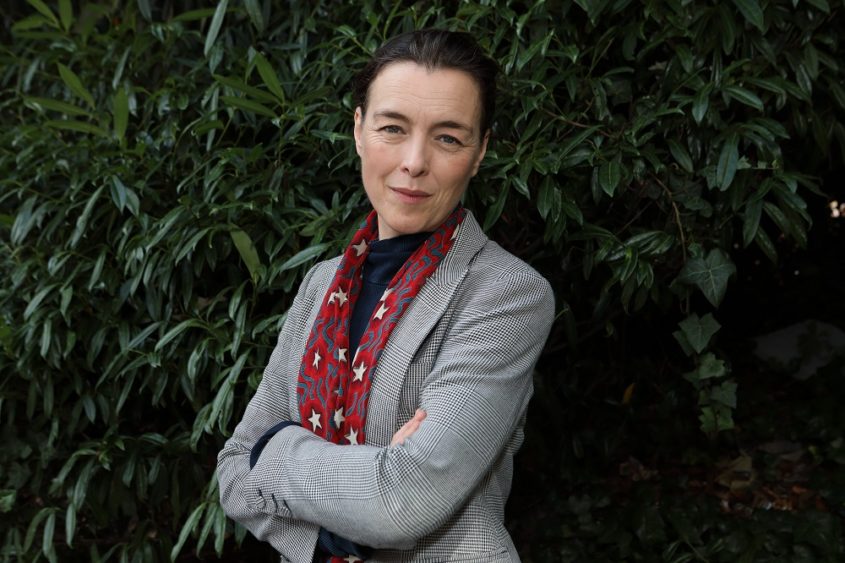Olivia Williams becomes Pancreatic Cancer UK ambassador
Actor Olivia Williams has written for the first time about surviving a rare type of cancer in the pancreas to throw a spotlight on the disease and mark her officially becoming a Pancreatic Cancer UK Ambassador.
In an article for Vogue magazine on sale this week, Olivia describes the severe emotional strain she endured throughout the almost-four year period from her first symptoms in October 2014 to diagnosis.
Olivia has starred in The Sixth Sense, Victoria & Abdul, and Anna Karenina among many other popular productions in a career spanning film, TV and theatre. She was in her trailer on a film set in June 2018 when she received an email confirming she had a VIPoma, a rare form of pancreatic neuroendocrine tumour (PancNET), in the body and tail of her pancreas.
Fortunately, Olivia was able to have surgery – not the Whipple’s procedure used to treat some patients with the most common form of pancreatic cancer, pancreatic ductal adenocarcinoma (PDAC) – but a distal pancreatectomy and splenectomy.


Since recovering from the seven-and-a-half-hour operation that saved her life, she has become a committed supporter of Pancreatic Cancer UK. Like many people affected by the disease, Olivia was initially misdiagnosed several times as doctors on three continents struggled to explain her symptoms. The vague symptoms for all types of pancreatic cancer and the lack of an early detection test, pose a huge challenge for doctors, and Olivia is particularly passionate about improving early diagnosis, a critical factor in transforming survival for future patients.
Earlier this year Olivia visited Professor Steve Pereira and his team at the hub of the Pancreatic Cancer UK Early Diagnosis Research Alliance, an innovative new project to find the first-ever simple diagnostic test for the disease by 2024. Thanks to the incredible generosity of our supporters, Pancreatic Cancer UK has been able to fund this Alliance, which unites the brightest scientists across the country to develop a new tool sensitive to both PDACs and PancNETs. Once validated, the tool will represent the most accurate early detection test for the disease ever created and will help doctors quickly identify patients who need urgent investigation and treatment.
To accomplish this the researchers are using their combined expertise from multiple different fields are collecting the largest biobank of samples of its kind from patients with vague symptoms to validate potential new diagnostic tools in a live clinical trial. Crucially the team are simultaneously considering how any new test could be successfully integrated and used within the NHS. By considering the challenges in one project, the researchers are confident of delivering a new test that can quickly be adopted by the NHS and help transform pancreatic cancer survival.
Pancreatic Cancer UK Ambassador Olivia Williams said:
“Having recovered from radical surgery on my pancreas, liver, spleen and gallbladder for a type of pancreatic cancer, I was casting about for how to thank the people who had undoubtedly saved my life. At first I was hesitant to become an ambassador because I didn’t feel I had enough fame or clout to be of much use. When Pancreatic Cancer UK came back and explained that I hadn’t been asked because I was famous, but because there are so few survivors, I realised the extremity of the situation.”
“Early diagnosis could have saved the lives of so many people – among them my friend Tom Beard, my acting hero Alan Rickman and The Queen of Soul Aretha Franklin. By the time any of these beloved people were symptomatic, too much damage had been done by cancer. Please help me make difference to the shocking survival statistics for anyone diagnosed with pancreatic cancer.”
Diana Jupp, CEO of Pancreatic Cancer UK, said:
“It’s incredibly rare for someone in the public eye who has experienced pancreatic cancer to step forward and share what they have been through, as Olivia has done so candidly and with such courage. I am delighted she agreed to become an ambassador for our charity and am hugely grateful for her passion to raise awareness of all types of this devastating disease. The shocking story of her struggle for a diagnosis over nearly four years highlights, more than ever, the importance of developing the first simple test to help doctors detect pancreatic cancers far earlier and give all patients the best possible chance of survival. Olivia shares our determination to transform the future for people affected by pancreatic cancer and I am really excited about what we can do together.”

